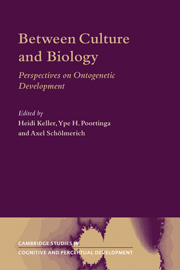Book contents
- Frontmatter
- Contents
- List of figures
- List of tables
- Notes on contributors
- Acknowledgements
- Introduction
- Part I Setting the scene
- Part II Perspectives on development informed by culture
- 4 Indian parents' ethnotheories as reflections of the Hindu scheme of child and human development
- 5 Indigenous conceptions of childhood development and social realities in southern Africa
- 6 The myth of lurking chaos
- 7 Integrating cultural, psychological and biological perspectives in understanding child development
- Part III Perspectives on development drawing from the universal and the specific
- Part IV Perspectives on development informed by evolutionary thinking
- Part V Metaperspectives
- Author index
- Subject index
- Cambridge Cultural Social Studies
4 - Indian parents' ethnotheories as reflections of the Hindu scheme of child and human development
Published online by Cambridge University Press: 22 September 2009
- Frontmatter
- Contents
- List of figures
- List of tables
- Notes on contributors
- Acknowledgements
- Introduction
- Part I Setting the scene
- Part II Perspectives on development informed by culture
- 4 Indian parents' ethnotheories as reflections of the Hindu scheme of child and human development
- 5 Indigenous conceptions of childhood development and social realities in southern Africa
- 6 The myth of lurking chaos
- 7 Integrating cultural, psychological and biological perspectives in understanding child development
- Part III Perspectives on development drawing from the universal and the specific
- Part IV Perspectives on development informed by evolutionary thinking
- Part V Metaperspectives
- Author index
- Subject index
- Cambridge Cultural Social Studies
Summary
Traditional cultural beliefs regarding the value of children and goals of child rearing provide the images and set the standards for developmental theorizing in predominantly Hindu India. Hinduism, often defined as a way of life rather than as a religion in the narrow sense of the word, permeates all aspects of daily life including parental ideas, beliefs and practices related to child rearing.
The present chapter delineates the Hindu world view of human development and examines its pervasive influence on parental ethnotheories of child rearing as evinced in empirical evidence, related beliefs regarding value of children, qualities desired in a ‘good child’ and in cultural rules governing marriage partner selection. The acknowledgement of the interaction of culture and biology, the central theme of this book, emerges at two levels: (1) Marriage is viewed as a sacrament, that ‘sows the seeds of a thousand years’ (i.e. determines genetic inheritance) and hence a union between families and not individuals, to be carefully arranged by the experienced elders rather than left to inexperienced young people; (2) The centrality of karma associated with the belief in an endless cycle of birth and death (until salvation is attained through moksha or mukti). Within each lifetime the individual can influence his or her karma by balancing ‘right’ and ‘wrong’ actions. Each individual starts the next life with the balance of gunas (roughly a highly personal and individual unconscious).
- Type
- Chapter
- Information
- Between Culture and BiologyPerspectives on Ontogenetic Development, pp. 79 - 88Publisher: Cambridge University PressPrint publication year: 2002
- 31
- Cited by

